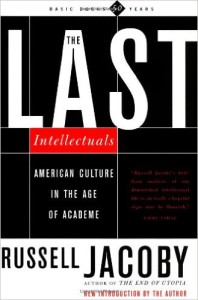 I will be moderating the Friday night plenary session of the upcoming S-USIH Conference on the topic of “Public Intellectuals since Russell Jacoby’s The Last Intellectuals.” In addition to Russell Jacoby (University of California-Los Angeles), this panel will include Tim Goeglein (Focus on the Family), Jonathan Holloway (Yale University), Claire Potter, (The New School), and Leo Ribuffo (George Washington University).
I will be moderating the Friday night plenary session of the upcoming S-USIH Conference on the topic of “Public Intellectuals since Russell Jacoby’s The Last Intellectuals.” In addition to Russell Jacoby (University of California-Los Angeles), this panel will include Tim Goeglein (Focus on the Family), Jonathan Holloway (Yale University), Claire Potter, (The New School), and Leo Ribuffo (George Washington University).
I am hoping for a diverse and wide-ranging conversation about “public intellectuals,” whatever those are, and given our panelists I don’t think I’ll be disappointed. But I would like the starting point to take off from Jacoby’s book which is now almost 30 years old. How have his arguments held up? What’s different about “American Culture in the Age of Academe”? Are we still in the Age of Academe?
Since the S-USIH Conference grew out of this blog, it’s only fitting that our commentariat have some say about this plenary session. What questions would you ask? What do you want to know about intellectual life from this group of panelists? Let’s here from you all.

2 Thoughts on this Post
S-USIH Comment Policy
We ask that those who participate in the discussions generated in the Comments section do so with the same decorum as they would in any other academic setting or context. Since the USIH bloggers write under our real names, we would prefer that our commenters also identify themselves by their real name. As our primary goal is to stimulate and engage in fruitful and productive discussion, ad hominem attacks (personal or professional), unnecessary insults, and/or mean-spiritedness have no place in the USIH Blog’s Comments section. Therefore, we reserve the right to remove any comments that contain any of the above and/or are not intended to further the discussion of the topic of the post. We welcome suggestions for corrections to any of our posts. As the official blog of the Society of US Intellectual History, we hope to foster a diverse community of scholars and readers who engage with one another in discussions of US intellectual history, broadly understood.
I’d love to hear about public intellectuals in the digital age — the use of blogging, Twitter, and other digital media as platforms for public intellectuals. With Claire Potter on the panel, I’m sure there will be a fascinating discussion on this.
I’m interested in the effects of the persistent crisis in funding for the liberal arts. I was never persuaded by Jacoby’s depiction of academia as undermining public intellectual life, but his argument certainly needs to be reassessed in the current climate.